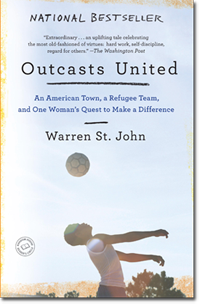Excerpt
Relatively quickly, it became clear that the story of the Fugees was also the story of a place, and that place offered as many intriguing mysteries as the boys and their coach. Until relatively recently, Clarkston had been a homogenous, white southern town, situated on 1.1 square miles of Georgia clay about thirteen miles east of downtown Atlanta. The town’s motto spoke to its humble origins: “Small Town . . . Big Heart.” But the resettlement process, which had the effect of cramming perhaps a century’s worth of normal migration patterns into roughly a decade, had tested the sentiment behind Clarkston’s motto.
Adding to the complication: the newcomers in Clarkston were not a homogenous linguistic or cultural group of, say, Somalis, whose appearance had transformed some small American towns like Lewiston, Maine, but a sampling of the world’s citizens from dozens of countries and ethnic groups. The local high school in Clarkston, once all white, now had students from more than fifty different countries. Cultures were colliding in Clarkston, and the result was a raw and exceptionally charged experiment in getting along.
When I first decided to write about the Fugees, I wasn’t sure how, or even if, the story of the remaking of Clarkston and the story of a refugee soccer team there would explicitly overlap. But about a month before I planned to leave New York to head to Clarkston to follow the Fugees, I got a clue that the stories were more intertwined than I could have realized. A dispute erupted between the mayor of Clarkston, a retired heating and plumbing contractor named Lee Swaney, and a group of young Sudanese refugees who were playing casual games of soccer on the only general-use field in the town park. The local paper, the Atlanta Journal-Constitution, got wind of the dispute and asked the mayor to explain his stance.
“There will be nothing but baseball down there as long as I’m mayor,” he told the paper. “Those fields weren’t made for soccer.”
The mayor’s proclamation had a direct impact on the Fugees, who had recently lost their home field after a dispute with their hosts at the local community center. Luma had hoped to relocate the Fugees to the town park—the very park from which Mayor Swaney had banned soccer. And so with only a few weeks to go before tryouts, she found herself scrambling to find her team a home.
The mayor’s decree hinted at tensions that went well beyond issues of turf management. In Clarkston, soccer, it seemed, meant something different from what it meant in most places. It was the international game in a town that had had its fill of international infl uences. The experiment in getting along, it seemed to me, was apparently very much ongoing, and the results would have relevance well beyond Clarkston. The question of how to cope with cultural, ethnic, and religious diversity—that loaded concept—is a pressing one. As the author Mary Pipher wrote about refugees who had been resettled in Nebraska in her book The Middle of Everywhere, “The refugee experience of dislocation, cultural bereavement, confusion and constant change will soon be all of our experience. As the world becomes globalized, we’ll all be searching for home.”

